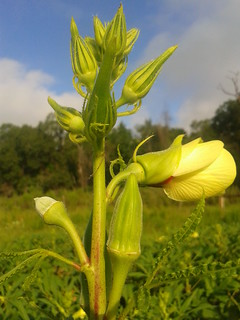 Well, this is unexpected.
Recent research shows a compound in okra
“promotes selective antitumor effects in human breast cancer cells and may represent a potential therapeutic to combat human breast cancer.”
Well, this is unexpected.
Recent research shows a compound in okra
“promotes selective antitumor effects in human breast cancer cells and may represent a potential therapeutic to combat human breast cancer.”
Here’s the abstract, Biotechnol Lett. 2014 Mar;36(3):461-9. doi: 10.1007/s10529-013-1382-4. Epub 2013 Oct 16. Lectin of Abelmoschus esculentus (okra) promotes selective antitumor effects in human breast cancer cells.
The anti-tumor effects of a newly-discovered lectin, isolated from okra, Abelmoschus esculentus (AEL), were investigated in human breast cancer (MCF7) and skin fibroblast (CCD-1059 sk) cells. AEL induced significant cell growth inhibition (63 %) in MCF7 cells. The expression of pro-apoptotic caspase-3, caspase-9, and p21 genes was increased in MCF7 cells treated with AEL, compared to those treated with controls. In addition, AEL treatment increased the Bax/Bcl-2 ratio in MCF7 cells. Flow cytometry also indicated that cell death (72 %) predominantly occurred through apoptosis. Thus, AEL in its native form promotes selective antitumor effects in human breast cancer cells and may represent a potential therapeutic to combat human breast cancer.
Don’t get your hopes up about that 72% figure: that seems to be that when cancer cell death occurred, 72% of it was related, not that 72% of cancer cells were killed. The 63% cancer cell growth inhibition does seem promising, though.
There are even hints in another paper that okra may be related to lower rates of prostate cancer:
…a “Southern” pattern, which was characterized by higher intakes of foods such as okra, cornbread, or sweet potatoes. The “Southern pattern” had a suggestive inverse association with prostate cancer risk (highest versus lowest tertile: RR, 0.6; 95% CI, 0.4-1.1; Ptrend = 0.08). The authors speculated that the observed association was due to living in the South, which may be related to lower risk of prostate cancer due to higher sunlight (vitamin D) exposure. In that study, statistical power was limited (136 cases). In a small case-control study from Canada (80 cases) a “processed diet” was significantly associated with an increased risk of prostate cancer (4).
So this survey paper couldn’t really find any research that directly associated okra eating with lowered prostate cancer risk, but it did find one study that showed a diet including okra had some slight decreased risk, and another study that showed a significant increased risk for a diet of processed foods. So okra is better than processed foods for prostate cancer, and it tastes better, too. That was Dietary Patterns and Risk of Prostate Cancer in U.S. Men, by Kana Wu1, Frank B. Hu1, Walter C. Willett1 and Edward Giovannucci1, doi: 10.1158/1055-9965.EPI-05-0100, Cancer Epidemiol Biomarkers Prev January 2006 15; 167.
The association with okra helping against breast cancer is much clearer.
-jsq
Short Link: